OCZ Vertex 4 Review (128GB), Firmware 1.4/1.5 Tested
by Kristian Vättö on August 4, 2012 10:00 AM ESTRandom Read/Write Speed
The four corners of SSD performance are as follows: random read, random write, sequential read and sequential write speed. Random accesses are generally small in size, while sequential accesses tend to be larger and thus we have the four Iometer tests we use in all of our reviews. Our first test writes 4KB in a completely random pattern over an 8GB space of the drive to simulate the sort of random access that you'd see on an OS drive (even this is more stressful than a normal desktop user would see).
We perform three concurrent IOs and run the test for 3 minutes. The results reported are in average MB/s over the entire time. We use both standard pseudo randomly generated data for each write as well as fully random data to show you both the maximum and minimum performance offered by SandForce based drives in these tests. The average performance of SF drives will likely be somewhere in between the two values for each drive you see in the graphs. For an understanding of why this matters, read our original SandForce article.
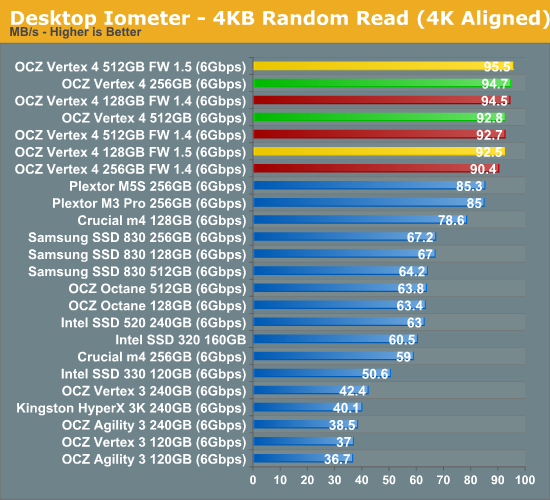
.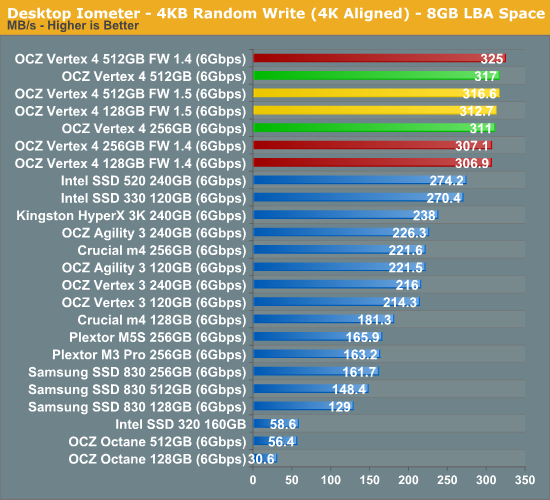
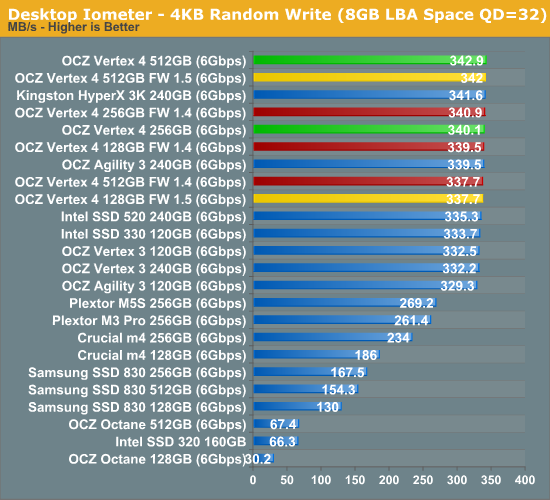
Neither the 1.4 or 1.5 firmware promised any improvements regarding random read/write performance.
As for the 128GB model, which is new in our tests, its random read/write performance is actually on-par with 256GB and 512GB capacities. This is a pleasant surprise the difference between the 128GB and 256GB capacities in many families can be quite substantial (e.g. Samsung's SSD 830).
Sequential Read/Write Speed
To measure sequential performance we ran a one minute long 128KB sequential test over the entire span of the drive at a queue depth of 1. The results reported are in average MB/s over the entire test length.
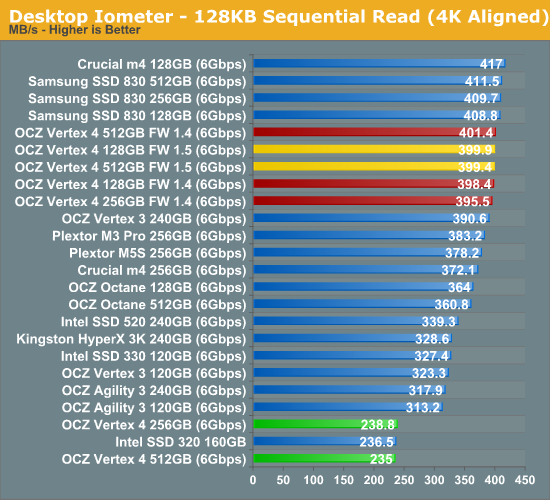
It's relieving to look at the graph above. It's now a fact that the 1.4 firmware fixes the sequential read speed at low queue depths issue. Not only does the firmware fix the issue, the sequential read performance is also very good.
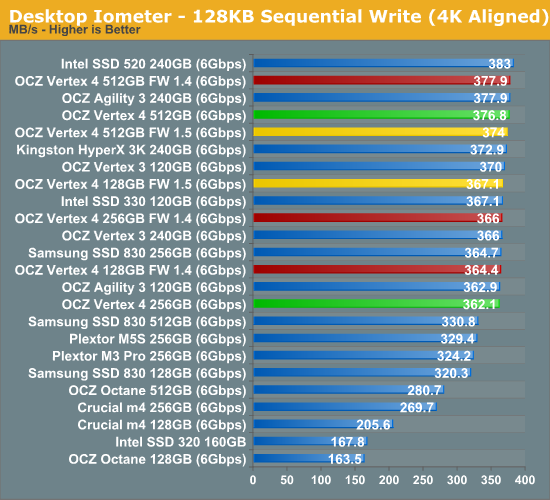
OCZ was promising increased sequential write performance for all models with the 1.5 firmware but at least in Iometer, at low queue depths, the difference is negligible. We'll take a look at AS-SSD and ATTO at higher queue depths next.










60 Comments
View All Comments
menting - Sunday, August 5, 2012 - link
aside from the first generation SSD that never got public release, Crucial uses the marvell controller with in-house firmware.They are looking to make their own controller in the future AFAIK, but I dont know when that is supposed to happen.
0ldman79 - Tuesday, August 7, 2012 - link
I'll have to back up the customer review of Crucial. I had a problem with Crucial once about 14 years ago. After a 5 minute phone call it took about a week and I had a replacement stick in my hand.Sound like Crucial's quality control went to pot for a little while there. Two bad products in 15 years... wow.
JNo - Sunday, August 5, 2012 - link
Quite. In the UK the Samsung 830 is cheaper than the Vertex 4 (at 256GB for example).The 830 is cheaper, faster, made by a company that also manufactures all the components and firmware *and* has a much more reliable track record both for the drive and especially for SSDs in general where OCZ has been plagued by poor quality (I don't care if it was because of unreliable sandforce controllers - they decided to buy them and sell them).
It's a no brainer imo - DON'T buy the Vertex 4! Why would you?! This article spent did a lot of good analysis when it could have just been a one-pager saying that the Vertex 4 has new firmware which makes it slightly faster in certain conditions but it's still slower and more expensive than competition which has a more reliable track record.
Coup27 - Sunday, August 5, 2012 - link
I like Crucial, but you really need to get your facts straight before spouting off like that. As has been mentioned below, the m4 controller is made by Marvell and is in use in more SSD's than the m4.The m4 has also had 5 firmware updates, one of which was to correct a catastrophic failure after 6 months of use.
Samsung is the ONLY SSD vendor who makes all the parts.
pc_void - Tuesday, August 14, 2012 - link
" It's a very dirty under handed tactic to get good benchmark scales by leaving it under 50% than the customer not knowingly gets screwed."Yet Toms writes: "OCZ certainly ups the Vertex 4's game with its new software, and we commend the fact that the company is striving to improve its products."
The OPPOSITE of what you say. Hmmm.
brichter - Wednesday, September 5, 2012 - link
You're correct, I didn't find the 512GB for $385 final, it was $379, $359 after $20 rebate. No shipping as I bought it in-store and no tax as I'm a resident of Oregon.The OCZ has 256 bit AES hw encryption, whereas the Crucial doesn't support hw encryption at all.
I own both a Crucial and (now) an OCZ, they are comparable in performance judged by my butt -dyno, with 2 MBP 8,2s side by side. Both these drives are faster in my Macs than in my Windows machines, there wasn't more than a couple seconds difference in boot times on my Win7 desktop between the SSDs and the RAID1 (2x 500GB Seagate spinning platter drives), so the bang per buck is much better with the cheap 500GB Seagates in a Windows box.
The following comment comes from the Tom's review, dated a couple of weeks before your post:
But our story doesn't simply end with vindicated testing results. OCZ quickly pushed out a firmware version 1.5 to alleviate some of what we observed the last time around. The latest build significantly helps the drive to remain in “performance mode” and significantly reduces the shortcomings identified in OCZ Vertex 4 128 GB: Testing Write Performance With Firmware 1.4.
MrSpadge - Sunday, August 5, 2012 - link
No. "Performance Mode" is a bonus feature, which you may or may not get, depending on your usage of the drive. Sure, benchmarks should take this into account. However, the practical differences between any modern high-performance SSDs are small anyway.mattlach - Sunday, August 5, 2012 - link
I am also concerned about this.How much does the performance differ between performance mode and normal mode?
I bought this drive based on previous reviews which did not mention this feature.
I am concerned that once I add more data to the drive, I'll get something significantly worse than I paid for.
Omoronovo - Sunday, August 5, 2012 - link
As the article states, you will get the same performance you would have had you bought the drive when it released (or with 1.3 firmware).You bought the drive based on previous reviews which were on older firmware which didn't have this feature.
When at less than 50% drive capacity you get almost double write performance and better overall performance in many situations. When you go past 50%, you still get improved write performance (improvements in the firmware that extend beyond performance mode), but you just lose the extra sequential write speeds which you wouldn't have had in the first place without the update.
You aren't going to get anything worse than EXACTLY what you paid for; just that in many situations you'll now get something BETTER.
mattlach - Monday, August 6, 2012 - link
I didn't base my purchase off of 1.3 firmware reviews.I saw those and thought "my the read performance of this thing is surprisingly poor", and then continued my research of other drives.
Then other sites 1.4 and 1.5 reviews started coming out, showing the read speed issue having been resolved (but not mentioning the performance mode) which is when I bought the drive.
As always Anand's reviews are better than other sites on SSD's and now I am aware of this issue, and almost feel cheated somehow...
So are you saying this mostly impacts write performance? If that is the case I am less concerned. I write once and read many, so I don't care as much about the write performance as I do about the read performance.